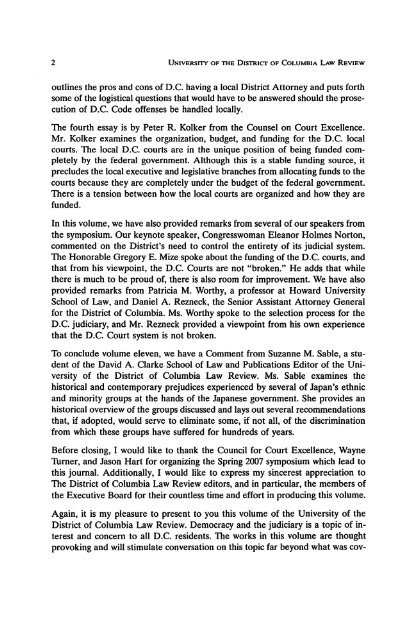Download Electronic Version - UDC Law Review
Download Electronic Version - UDC Law Review
Download Electronic Version - UDC Law Review
Create successful ePaper yourself
Turn your PDF publications into a flip-book with our unique Google optimized e-Paper software.
2 UNIVERSITY OF THE DISTRlcr OF COLUMBIA LAW REVIEW<br />
outlines the pros and cons of D.C. having a local District Attorney and puts forth<br />
some of the logistical questions that would have to be answered should the prosecution<br />
of D.C. Code offenses be handled locally.<br />
The fourth essay is by Peter R. Kolker from the Counsel on Court Excellence.<br />
Mr. Kolker examines the organization, budget, and funding for the D.C. local<br />
courts. The local D.C. courts are in the unique position of being funded completely<br />
by the federal government. Although this is a stable funding source, it<br />
precludes the local executive and legislative branches from allocating funds to the<br />
courts because they are completely under the budget of the federal government.<br />
There is a tension between how the local courts are organized and how they are<br />
funded.<br />
In this volume, we have also provided remarks from several of our speakers from<br />
the symposium. Our keynote speaker, Congresswoman Eleanor Holmes Norton,<br />
commented on the District's need to control the entirety of its judicial system.<br />
The Honorable Gregory E. Mize spoke about the funding of the D.C. courts, and<br />
that from his viewpoint, the D.C. Courts are not "broken." He adds that while<br />
there is much to be proud of, there is also room for improvement. We have also<br />
provided remarks from Patricia M. Worthy, a professor at Howard University<br />
School of <strong>Law</strong>, and Daniel A. Rezneck, the Senior Assistant Attorney General<br />
for the District of Columbia. Ms. Worthy spoke to the selection process for the<br />
D.C. judiciary, and Mr. Rezneck provided a viewpoint from his own experience<br />
that the D.C. Court system is not broken.<br />
To conclude volume eleven, we have a Comment from Suzanne M. Sable, a student<br />
of the David A. Clarke School of <strong>Law</strong> and Publications Editor of the University<br />
of the District of Columbia <strong>Law</strong> <strong>Review</strong>. Ms. Sable examines the<br />
historical and contemporary prejudices experienced by several of Japan's ethnic<br />
and minority groups at the hands of the Japanese government. She provides an<br />
historical overview of the groups discussed and lays out several recommendations<br />
that, if adopted, would serve to eliminate some, if not all, of the discrimination<br />
from which these groups have suffered for hundreds of years.<br />
Before closing, I would like to thank the Council for Court Excellence, Wayne<br />
Thrner, and Jason Hart for organizing the Spring 2007 symposium which lead to<br />
this journal. Additionally, I would like to express my sincerest appreciation to<br />
The District of Columbia <strong>Law</strong> <strong>Review</strong> editors, and in particular, the members of<br />
the Executive Board for their countless time and effort in producing this volume.<br />
Again, it is my pleasure to present to you this volume of the University of the<br />
District of Columbia <strong>Law</strong> <strong>Review</strong>. Democracy and the judiciary is a topic of interest<br />
and concern to all D.C. residents. The works in this volume are thought<br />
provoking and will stimulate conversation on this topic far beyond what was cov-














